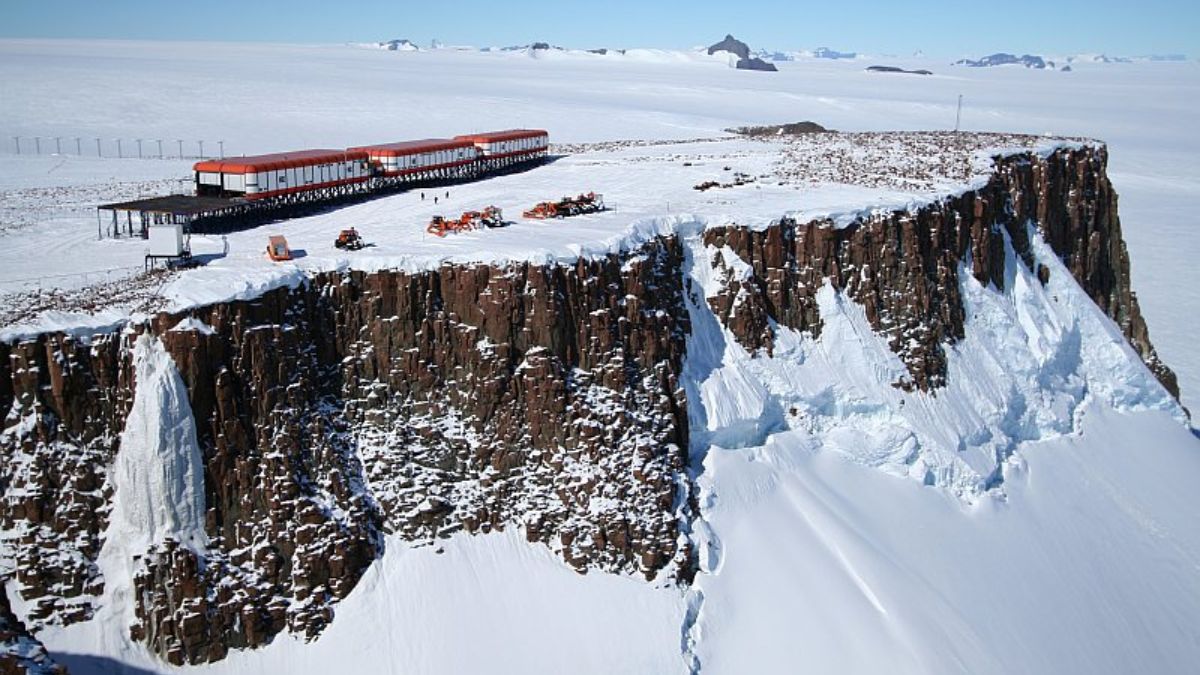A group of scientists stationed at a remote Antarctic research base are living a nightmare—not because of the unforgiving cold or the endless isolation that surrounds them, but because one of their own has turned against them.
A researcher at South Africa’s Sanae IV research base sent a desperate email, alleging that a team member had physically and sexually assaulted a colleague and even threatened to kill someone, according to The Sunday Times.
The scientist who made the allegations said they feared for their own safety as well as that of their colleagues, urgently pleading for “immediate action,” the South African newspaper stated, citing the email that was sent last month.
Stranded on a freezing clifftop nearly 4,000 km from Africa’s southernmost point, the team has no way out until December. They are now forced to endure a tense and dangerous situation in one of the most isolated places on the planet.
But what exactly happened? What triggered the attack? Here’s what we know so far.
‘Environment of fear’
Last week, a scientist at the Sanae IV research station sent a chilling email, warning of a colleague’s “deeply disturbing behaviour” that had created an “environment of fear and intimidation” within the team.
“His behaviour has become increasingly egregious, and I am experiencing significant difficulty in feeling secure in his presence,” the email read, according to The Sunday Times. “It is imperative that immediate action is taken to ensure my safety and the safety of all employees.”
The names of both the person making the allegations and the accused have not been disclosed. The email further stated, “Furthermore, he threatened to kill [name withheld], creating an environment of fear and intimidation. I remain deeply concerned about my own safety, constantly wondering if I might become the next victim."
The scientist pleaded for rescue, claiming the situation had escalated dangerously. “Regrettably, [his] behaviour has escalated to a point that is deeply disturbing. Specifically, he physically assaulted [name withheld], which is a grave violation of personal safety and workplace norms,” the email read.
The Sanae IV base, located in Vesleskarvet, Queen Maud Land, sits around 4,000 km from South Africa’s closest point, meaning there is minimal human contact apart from themselves. The station, home to a small team of experts in meteorology, medicine, and engineering, conducts crucial research in climate monitoring, atmospheric studies, and geological surveys.
Living in such extreme conditions is no easy task, the ten-member team is entirely cut off on a base where the average winter temperature is minus 23 degree Celsius and wind speeds can reach 135 mph.
Also read: Who is Akshay Nanavati, an Indian-origin ex-US marine on a 110-day solo quest to Antarctica?
What triggered the conflict?
South Africa’s environment minister, Dion George, explained that the incident stemmed from a disagreement over work responsibilities.
“It was a dispute over a task the team leader wanted the team to do—a weather-dependent task that required a schedule change,” George told BBC.
What started as a verbal altercation quickly escalated, leading to a physical assault. “You can imagine what it’s like—it’s close quarters, and people do get cabin fever. It can be very disorientating,” he added.
Though all researchers undergo psychometric evaluations before heading to Antarctica, the extreme conditions of the icy continent can push even the most prepared individuals to their limits.
Alan Chambers, a professional explorer who completed a 700-mile skiing expedition to the South Pole last year, explained the psychological impact of such isolation.
“From a psychological perspective, it’s a very, very lonely place. There’s very little interaction with humans or animals, so if you’re in a camp or a research centre, you’re with those people for six months, if not a year,” he told The Times.
He added, “What I think it does, from a psychological point of view, is that everything becomes heightened. It’s all white—there’s no colour, no noise, and nothing you would see as normal. So everybody’s behaviour—including your own—gets magnified, and the little things become the big things.”
In 2017, a member of South Africa’s Antarctic research team allegedly attacked a colleague’s laptop with an axe—after a woman involved with the colleague rejected his marriage proposal.
What’s next?
Dion George confirmed that an “intervention is in place” and the person responsible for the assault is “remorseful and has been psychologically re-evaluated willingly.”
While he said that he was “considering options,” a rescue mission in the Antarctic would be extremely difficult. The team is not scheduled to be relieved until December, and with winter storms closing in, any evacuation attempt would have to navigate treacherous conditions, including freezing temperatures and powerful winds.
A spokesperson for South Africa’s Department of Forestry, Fisheries, and the Environment stated that the department’s wellness unit is in continuous contact with the team to “find solutions and a sustainable way forward for the wellbeing of the team members at the remote base.”
“A full investigation is currently being commissioned, and the department will act accordingly in relation to any wrong conduct against any official that has misconducted themselves,” the spokesperson added.
South Africa has maintained a research presence in Antarctica since 1960, initially taking over a Norwegian base.
Today, researchers live in bright orange modules that resemble shipping containers. These units house labs, offices, sleeping quarters, a library, games room, TV rooms, and even a bar. Diesel generators provide heat, while water comes from a snow smelter. A satellite connection ensures limited communication with the outside world.
With input from agencies
)